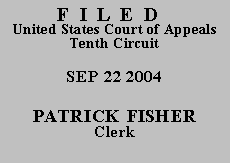

| DEAN H. CHRISTENSEN, |
|
| v. | |
| UNITED STATES DEPARTMENT OF THE INTERIOR, |
We assume the truth of the factual allegations in Plaintiff's complaint. See Wyoming v. United States, 279 F.3d 1214, 1222 (10th Cir. 2002). In 1993 a grand jury was convened to investigate Plaintiff's operation of oil wells and payment of royalties. Several DOI employees knowingly gave false testimony that he had not paid certain royalties. In 1996 two DOI employees released their testimony to the IRS, which filed a $500,000 claim against Plaintiff. Plaintiff subsequently refuted this testimony, and the IRS claim was reduced to zero.
Plaintiff subsequently filed a tort action against the DOI employees in Utah state court. The United States was substituted as a defendant and the action removed to federal court. The federal court dismissed the complaint, directing Plaintiff to pursue administrative remedies through the DOI. See 28 U.S.C. § 2675(a) (under Federal Tort Claims Act (FTCA), claimant must exhaust administrative remedies before pursuing claims in federal court). After his claims were denied on October 7, 2002, Plaintiff filed suit in federal district court. His complaint alleged federal question jurisdiction based on (1) disclosure of grand jury testimony in violation of Federal Rule of Criminal Procedure 6(e); (2) knowing disclosure of false information to a federal bankruptcy court and grand jury under 16 U.S.C. § 1623; (3) filing a false claim with a bankruptcy court under 18 U.S.C. § 152; and (4) disclosure of information in violation of the Privacy Act, 5 U.S.C. § 552a.
Plaintiff conceded in the district court that the first three claims were barred by sovereign immunity, but argued that the Privacy Act claim waived sovereign immunity with respect to the other three claims. The district court did not address the argument because it found the Privacy Act claim to be barred by the statute of limitations. In response to Plaintiff's argument that the limitations period should have been tolled while he pursued administrative remedies, the court found that the matter pursued administratively "involved different claims and does not create any basis for tolling the Privacy Act statute of limitations." R. Doc. 15 at 6.
The Privacy Act bars a federal agency from disclosing records unless certain conditions are met. See 5 U.S.C. § 552a(b). An action arising under the Privacy Act may be brought "within two years from the date on which the cause of action arises." 5 U.S.C. § 552a(g)(5). A Privacy Act cause of action arises when the plaintiff knew or had reason to know of the violation. See Bergman v. United States, 751 F.2d 314, 316 (10th Cir. 1984).
Plaintiff claims that the DOI employees wrongfully disclosed information to the IRS in December 1996 and admits that he learned of the disclosures by June 1999. Thus, the limitations period expired no later than two years later, in June 2001. Plaintiff filed his complaint in federal district court on March 31, 2003. Although Plaintiff's appellate brief is less than clear, he seems to argue that he met the limitations deadline because he filed his administrative claim in May 2001.
The filing of Plaintiff's administrative claim is irrelevant to the Privacy Act limitations period, which applies to filing in federal court. See 5 U.S.C. § 552a(g)(5) ("[a]n action to enforce any liability created under this section may be brought in the district court of the United States . . . within two years from the date on which the cause of action arises. . . .") (emphasis added). Furthermore, there is no basis for tolling the limitations period while Plaintiff pursued his administrative claim, because there is no administrative exhaustion requirement when a plaintiff seeks damages under the Privacy Act, see, e.g., Quinn v. Stone, 978 F.2d 126, 137 & n.22 (3d Cir. 1992); Diedrich v. Department of Army, 878 F.2d 646, 647-48 (2d Cir. 1989), and thus, there was no impediment to raising Privacy Act claims in federal court while Plaintiff's administrative claims were pending.
We therefore AFFIRM the judgment of the district court.
ENTERED FOR THE COURT
Harris L Hartz
Circuit Judge
*.This order and judgment is not binding precedent, except under the doctrines of law of the case, res judicata, and collateral estoppel. The court generally disfavors the citation of orders and judgments; nevertheless, an order and judgment may be cited under the terms and conditions of 10th Cir. R. 36.3.